The truth Australia doesn’t want to hear about saving the Great Barrier Reef
SAVING the Great Barrier Reef should be about more than embracing a photo opp. We need to make the one hard decision that could actually save it.
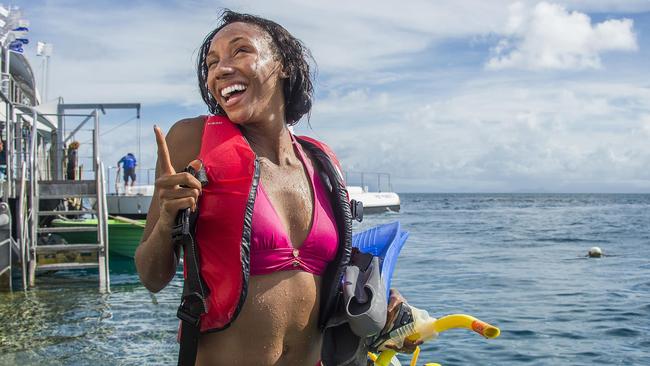
ONE of the country’s most loved landmarks is facing extinction and everyone is scrambling to do something about it — except making the one hard decision that could actually save it.
The plight of the Great Barrier Reef has become a global concern with Hollywood superstars, legendary documentary makers and billionaire entrepreneurs drawing attention to its fragile state.
On Thursday the ABC revealed secret modelling that showed it could cost up to $16 billion over the next 10 years just to meet water quality targets for the reef.
Both sides of government have announced more money to improve reef’s condition but the funding has so far been millions, not billions.
They are also ignoring calls for a coal moratorium, despite experts saying this will be crucial to preserving one of Australia’s most lucrative attractions.
While it might seem like a crazy idea to some, experts say blocking the construction of new mines would actually be good for the economy.
Is this something Australia should really be considering? And what would it cost us?
A COAL MORATORIUM SOUNDS EXTREME, IS IT REALLY NECESSARY?
We all want to ensure the Great Barrier Reef survives but is it really necessary to block new coal mines?
It may not be the answer people want to hear, but experts believe it’s something Australia needs to do.
Climate change was identified as the most serious threat to the Great Barrier Reef, according to the government-funded Great Barrier Reef Marine Park Authority’s report.
Australia has already promised to keep temperature rises to under two degrees as part of the Paris global climate change agreement, but meeting this target may not be enough to save the reef.
“It is highly likely that two degrees of warming (above pre-industrial rates) would destroy the Great Barrier Reef as we know it,” Professor Will Steffen of the Climate Council told news.com.au.
“There may be a few individual reefs or pockets of corals that survive, but the vast sweep of reefs along Australia’s northeast coast would be gone, converted into algae-based ecosystems.”
He is not the only one who feels this way. In April, a group of 56 scientists signed an open letter calling for Australia to block new coal mines and phase out coal-fired power stations.
WOULDN’T IT HURT US ECONOMICALLY?
It’s all well and good to have the best intentions, but many Australians may not be willing to sacrifice economic growth in order to preserve the reef. The good news is, we don’t have to.
Economist Stephen Bartos of Pegasus Economics told news.com.au that if Australia pulled out of coal abruptly there would be a short term impact on growth but in the longer term moving away from mining would actually be a good thing.
This is because the growth we get from mining is mostly temporary and largely comes from jobs created during construction. Once they become operational mines don’t need as many people to keep them running.
“Not investing in coal mines doesn’t harm the economy if we invest in other productive things instead,” Mr Bartos said.
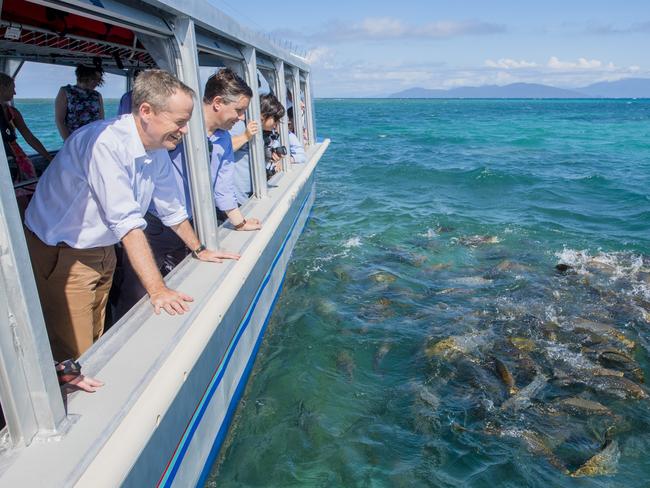
“People forget the economy is dynamic, what happens if we don’t invest in Project A, is we’ve got the resources for Project B. It’s not a negative in reality, the economy adjusts.”
In particular, he said thermal coal used for power plants would probably not be a good future investment.
“The cost of renewables is falling rapidly and will likely be more economical than coal in the very near future,” he said.
The Australia Institute chief economist Richard Denniss said it might feel counterintuitive but stopping the development of new mines in Australia would be “very good” for the country.
“The world’s demand for coal is flat or declining,” he said. “So if new mines are built in Queensland they will push the world price of coal down.
“The best way to help existing coal miners is to prevent the construction of their competitors.”
Assoc Prof Denniss said claims the new Carmichael coal mine would create thousands of jobs had been hyped up. Adani once claimed the new mine in the Galilee Basin would create 10,000 jobs, but has since admitted in court that it was more likely to be about 1400 jobs, including indirect jobs, over 30 years.
“There are well over 150,000 unemployed people in Queensland, there is no scenario that building new coal mines will solve Queensland’s employment problem, especially when new coal mines harm the tourism industry in both the short term and the long term,” Assoc Prof Denniss said.
In contrast the Great Barrier Reef is estimated to generate revenues of $6 billion each year while employing 70,000 people.
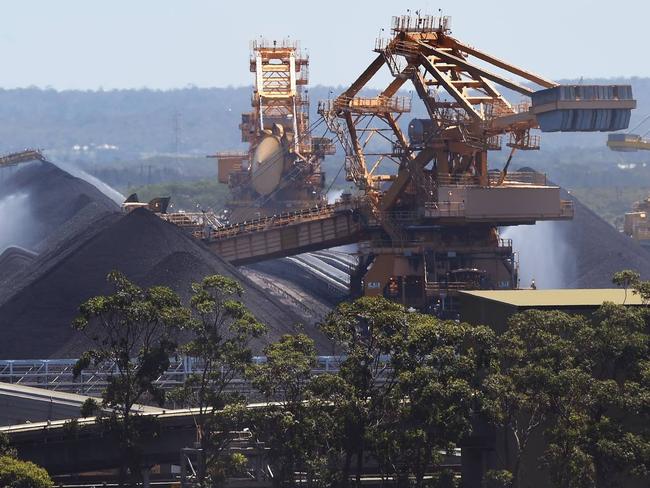
While some say the Queensland Government will benefit from mining royalties, Assoc Prof Denniss said the government had actually offered Adani a royalty holiday and no one knew exactly when it would start paying money.
He said tourism and manufacturing employed more people than mining, but the mining boom had actually damaged these industries because it pushed up the value of the Aussie dollar.
Australia now has the lowest proportion of manufacturing jobs in the OECD, according to a new report by the Centre for Future Work.
Assoc Prof Denniss said new jobs in the mining sector had been offset by the loss of jobs in other manufacturing sectors.
“No doubt the mining boom was very good for the mining industry, but it was devastating for Cairns tourism and for Australian manufacturing.”

WHAT IF WE SHUT DOWN THE COAL INDUSTRY?
The Minerals Council of Australia did not respond to questions specifically about the impact of blocking new coal mines, but warned of the consequences if the industry was shut down.
The Greens have called for subsidies to the fossil fuel sector to be cut and for all of Australia’s stationary electricity to come from renewable sources as soon as possible. It wants coal-reliant communities to transition away from the industry.
But the Minerals Council of Australia executive director for coal Greg Evans told news.com.au in a statement, that Australia would lose its second largest export and the economy would lose $6 billion in indirect wages.
The NSW and Queensland governments would lose nearly $3.5 billion in annual royalty payments, he said.
Mr Evans said the Greens policy overlooked the fact that nearly half of the coal produced in Australia was actually coking coal used to make steel, not for generating electricity.
“Australian coal is an essential ingredient in the steel used to make wind turbines. In fact about 220 tonnes of coking and thermal coal go into the manufacture of a wind turbine. No coal, no steel, no wind turbines.”
He said coal provided 71 per cent of Australia’s energy needs and was the cheapest source of energy to Australian households and businesses.
“The new Adani mine in the Galilee Basin is estimated to provide electricity to 82 million Indians who currently have no or little access to energy.”
‘IF WE DON’T ACT, OUR CHILDREN WILL ASK WHY’
With the future of the Great Barrier Reef hanging in the balance, some believe climate change could become an election issue. It has also been given a boost from Hollywood star Leonardo DiCaprio, legendary documentary maker Sir David Attenborough and billionaire entrepreneur Richard Branson, who have all highlighted the reef’s predicament.
Both major parties seem to have acknowledged it as potential vote changer, announcing millions in more funding but so far this has been aimed at addressing agricultural run-off and improving water quality.
The Coalition included an extra $171 million for the reef in its Budget including $6 million for a vessel to track down the coral-eating crown-of-thorns starfish.
Labor has gone even further, topping this up by an extra $377 million. This would go towards reducing nutrient run-off from farming, streamlining management, and boosting CSIRO marine research by $50 million.
Improving water quality of the reef is extremely important but both the Coalition and Labor acknowledge action on climate change will also be needed to save the reef.
On this front neither of their policies have been judged well by the Australian Conservation Foundation in a scorecard released this week.
RELATED: Easy guide to Liberal and Labor environment policies
The ACF rated the Coalition’s environment policy 11 out of 100 points, while Labor’s score was better at 53 points and the Greens topped the rating at 77 points.
The ACF assessed policies on clean energy, cutting pollution and protecting nature.
Prime Minister Malcolm Turnbull defended his government’s record on the reef, insisting the coalition was “doing a good job”. But he agreed global warming posed a threat to mass bleaching. “Plainly ... that requires a global solution,” he told reporters.
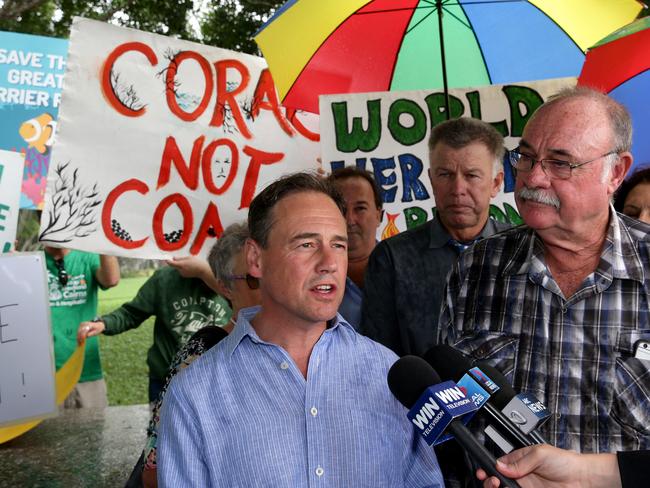
In announcing extra funding Labor leader Bill Shorten said: “The reef is in peril”.
“If we do not act, our children will rightly ask us why didn’t we,” he said.
Prof Steffen welcomed measures to address water quality and other threats, but believes the good work will be overwhelmed by the impacts of global warming.
Scientists found climate change and El Niño increased ocean temperatures by 1 degree during this year’s March bleaching event, which has already killed more than a third of the coral in the northern and central parts of the reef.
When asked whether it was possible to keep global warming under two degrees without a coal moratorium, Prof Steffen said transitioning out of coal as soon as possible would be essential to tackling climate change.
Despite this both sides of politics continue to approve the construction of new coal mines, including the massive Adani’s Carmichael coal mine in the Galilee basin.
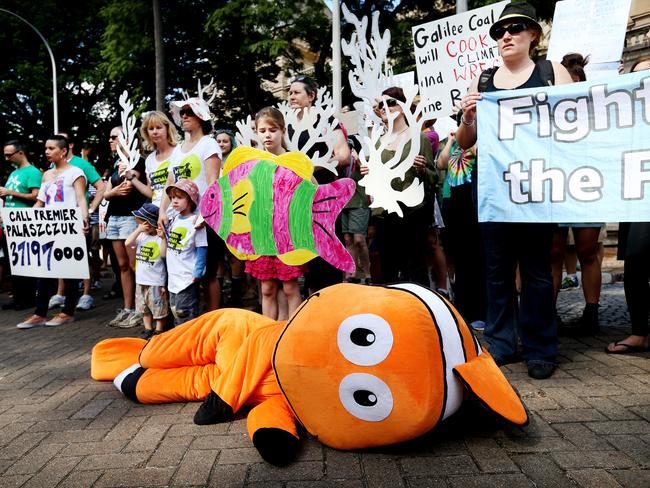
While these mines have been spruiked as great for the economy, it’s clear politicians also understand how important it is to protect Australia’s lucrative tourism industry.
This week it emerged Australia intervened to stop a United Nations agency from including the Great Barrier Reef in a report, saying “negative commentary” had impacted tourism in the past.
The government narrowly avoided seeing the reef listed on the UNESCO in-danger list last year, which would have been “catastrophic” for the tourism industry.
UNESCO last year expressed “concern” and “regret” over the Federal Government’s approval of the Abbot Point coal terminal expansion to ship extra coal produced by the new Adani mine through a port near the reef.
The Federal Government underlined the importance of keeping the reef off the UNESCO “in danger” list after it was revealed it spent $100,000 lobbying the World Heritage Committee to convince them the reef was not in danger.
The efforts seemed to work with UNESCO deciding to leave the reef off the list, and instead monitoring its progress until 2017. The government also put forward a plan to protect the reef and abandoned plans to dump dredge spoil nearby.



